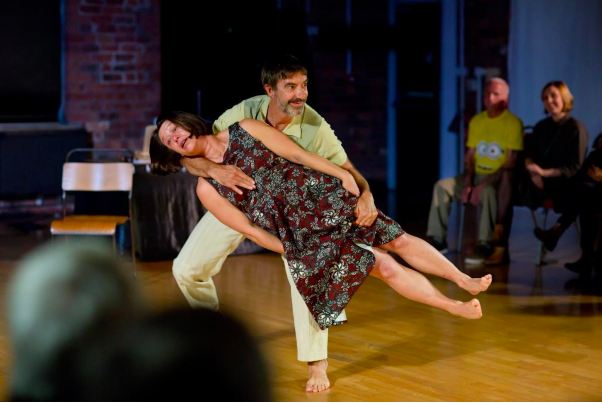Review from: Circomedia, Bristol; 21st October 2022
The old parable goes something like this: A giant ship’s engine broke down and no one could repair it, so they hired a mechanical engineer with over 40 years of experience. He inspected the engine very carefully, top to bottom. After seeing everything, the engineer unloaded the bag and pulled out a small hammer.
He gently tapped something. Soon, the engine came to life again. The engine has been fixed!
A week later, the ship owner received the engineer’s invoice for $20,000.
“What?!” exclaimed the owner, “he hardly did anything!”. So he replied to the engineer and asked for an itemised bill.
The engineer obliged, and replied:
Tap with a hammer: $2
Knowing where to knock and how much to knock: $19,998
The Rest of Our Lives is both that gentle hammer tap and the decades of experience that led to it. The show is created and performed by Jo Fong and George Orange who, according to the publicity blurb, have ‘100 years of life experience between them’. And it shows. This performance is as simple as the tap of a hammer, yet suggests the potential depths offered by decades of experience.
Walking into the theatre is like walking into an old friend’s home. We are greeted warmly, jovially, with ease. Fong and Orange have zero interest in the fourth wall: On the contrary, they want us to go on this journey with them and feel included and close. Most of the time it works wonderfully, the performers speaking casually and without concern for annunciation or projection; but it also meant that, even sitting in the second row, I frequently struggled to hear and understand what they were saying.
But I chose to let go of my need to understand the words, a reasonable choice considering that this show’s strength lays in its physical storytelling rather than the verbal – with the frequent and much appreciated assistance of an excellent and eclectic amalgamation of musical tracks ranging from Leonard Cohen to Maria Carey, David Bowie to Henry Purcell.
In the corner of the stage is a work desk with a laptop where the performers act as omnipotent DJs to the soundtrack, and above it is an electronic board that offers us the kind of questions artists (and people) of a certain age are bound to ask themselves: ‘How does it go from here?’, ‘Will I be alone?’, ‘Will I be remembered?’
These are big, terrifying, very real questions. Some of the other musings offered on the board appear to be in dialogue with these questions (if not necessarily answering them) – like ‘Age Against the Machine’ and ‘The Struggle is Real’.
These imposing questions are the undercurrent carrying the show throughout, but Fong and Orange don’t seem to be as bothered by them as one might imagine. Instead, they offer us a world where such concerns melt away, to be replaced by various scenes that make the viewer wonder what the rest of our lives would be like if we nurtured our inner child; if we were to give in to playfulness and silliness.
There is no cohesive narrative arc to the show, rather it’s a series of vignettes that delight and amuse. Orange’s introduction is a balletic, expressive dance to the sounds of Hozier’s ‘Take Me to Church‘, a whimsical ode to an ageing clown with a nod and a wink to a viral video of a younger and more agile dancer; in another delightful number the two dance out a strange pas-de-deux, part acrobatic part geriatric, Fong as stiff as a cadaver while Orange is visibly (and intentionally) playing out the macabre effort of carrying her to ‘Dance Me to the End of Love‘; and perhaps my favourite moment, Orange sitting in a chair, gently bopping and nodding, as ‘Killing in the Name‘ plays. The juxtaposition of the iconic lyric “Fuck you I won’t do what you tell me” and his movement is somewhat akin to a senior “Get off my lawn!” moment meeting inner, rebellious youth.
The show’s finale, which I won’t spoil for you, is utterly delightful and uplifting, and leaves the audience giddy and humming with energy. “Do you think the young people get what we’re saying?” Orange asks at some point in the show, and gets a roar of laughter from the audience; and maybe I didn’t. Maybe I’m still too young to understand. But nonetheless, I went home buzzing.
The Rest of Our Lives is both profoundly simple and profound in its simplicity. I did find myself wishing for that tap-of-a-hammer to be slightly less simplistic though, to suggest what the rest of my life could be other than play and dance. But hey, if this is what the rest of my life ends up like, it should be jolly fun.



